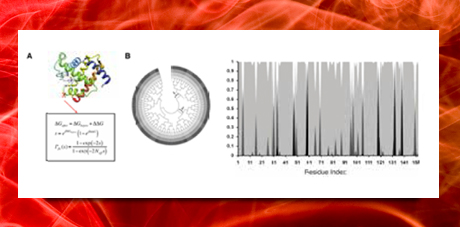
Survival of the fittest Molecules
Thermochemical data for Myoglobin (Mb) mutants were merged with a new physiological model of O2-transport and storage in muscles of deep-diving mammals.
Any change in living organisms is in principle caused by underlying changes in the molecular and cellular properties. Molecular evolution aims to relate natural variations in organisms and living systems all the way to the properties of their molecules. A possible application could be in improved design of enzymes and other industrially relevant molecules. The thesis describes the application of molecular evolution methodology to the study of the protein Myoglobin (Mb) in diving mammals such as sperm whales and Weddell seals.
Mb plays a key role in storage and transport of oxygen in mammals. Mb is present in both cardiac and skeletal muscles of vertebrates and in the body walls of invertebrates. The primary function of Mb is to increase the availability of O2 in muscle cells and provide the oxygen for the energy-producing mitochondria. The importance of this function is evident from typically 10-20 times more abundant Mb in diving mammals, compared to their terrestrial relatives.
In the project, a large set of previously reported thermochemical data for Mb mutants was merged with a new physiological model of O2-transport and storage in skeletal muscle cells. It was shown that O2-storage and transport are distinct functions that rank mutants and wild type (WT) Mb differently depending on O2 partial pressure.
Further, an integrated model of convective O2-transport and O2-affinity of mutant Mb was developed. The model quantifies the impact of mutations in Mb on the aerobic dive limits (ADL) of Weddell seals. This integration, the first quantitative relation from molecular properties to organism fitness, illustrates the superiority of WT Mb traits under specific physiological conditions that prolong the dive time, action radius, and thus fitness of the seals.
Thirdly, the observation of higher folding stabilities of cetacean Mbs compared to their terrestrial counterparts was investigated. Accelerated evolution in cetaceans was observed, and we identified seven positively selected sites in Mb. We showed that these sites contribute to Mb stabilization by favoring hydrophobic folding, structural integrity, and intra-helical hydrogen bonds.
Finally, a model that combines explicit evolution of Mb sequences, folding stability, and application of maximum likelihood (ML) estimation of evolution rate (ER) was developed. We found that ER predicted by ML methods is highly correlated with ER from simulations using the explicit sequence information by counting the number of synonymous and non-synonymous mutations fixed in the population. This agreement is strongest in the regime of high stability where proteins are mostly evolving neutrally.
Overall, this thesis provides one of the first evolutionary examples of a direct impact of changes in protein function and thermodynamic stability on the fitness of the organism. Moreover, the thesis provides a number of theoretical findings directly testable in future experiments.